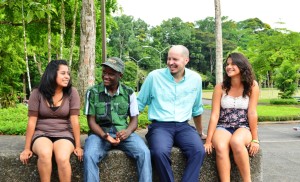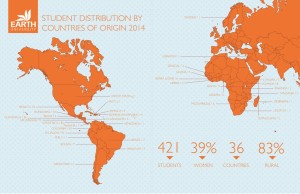Finding leaders for a better tomorrow
As any farmer might tell you, the first step in producing a healthy crop is finding the perfect seed, one that will grow and flourish under the right conditions. At EARTH, it is much the same: we start by painstakingly selecting our students to ensure that each and every one will take full advantage of the opportunity to study at EARTH to grow into a leader of change.
As director of admissions, Junior Acosta explains that EARTH’s personalized and dynamic admissions process makes it possible to select students on much more than just standardized test scores. Every year, EARTH sends its professors to more than 30 countries around the world to personally meet each pre-selected candidate. There, professors conduct group and personal interviews and administer an aptitude test. Although Junior readily points out that there is no “magic formula” for perfectly predicting a student’s probability of success, the evidence speaks for itself: in spite of the wide divergence in educational quality in secondary schools in rural communities in the developing world, 84% of students graduate in five years, a significantly higher graduation rate than most universities around the world.
Says Junior, “We go the extra mile in evaluating our students and we have many variables to base our decisions on, which allows us to consistently find the best students for EARTH.”
Professor Kent McLeod has taught English and Public Speaking at EARTH for nearly two years, and has traveled to Costa Rica, Sierra Leone, Liberia, El Salvador and Nigeria to interview and select candidates for admission. He affirms that, “Admissions is something I take very seriously because in many ways, we are changing a person’s life. For me, the interview is my chance to get to know them as a person and I enjoy it very much, but it is also an incredible responsibility.”

Dr. Kent McLeod (third from left) states that, “When I see students that I interviewed arrive on campus, I feel so proud.” Kent is pictured here with The MasterCard Foundation scholars Diana Ruiz (’17, El Salvador), Newton Torlon Jr. (’17, Liberia) and Josselyn Calidonia (’17, El Salvador).
He adds that, “We are very lucky to be able to hand-select our students and the fact that EARTH is willing to invest the amount of time and resources that we do speaks volumes about our values and priorities.”
This tailored approach to finding students also has the added benefit of making an undeniably positive first impression on potential candidates, who are often shocked that professors would come all the way from Costa Rica to the far reaches of Africa, Latin America and the Caribbean. Kent states that, “For the student it gives them an idea of what they can expect at EARTH: it is personalized, and it doesn’t stop at the interview. It shows them how special the education and whole experience is at EARTH, and how important they are to us.”
For veteran teacher Xinia Avendaño, who is celebrating her 19th year teaching mathematics on campus, her many admissions trips around Central America have helped her answer the question: “Who is an EARTH student?”
“An EARTH student has many qualities: leadership, values, and a sense of purpose. Obviously these qualities are subjective and sometimes difficult to perceive, but after a while you become really good at picking up on the things that indicate a successful EARTH student. Grades are important, but they are just one part of the picture. They have to show honesty and authenticity; after so many years I can tell when someone has rehearsed a speech or their heart just isn’t in it.”
Each year, the months of preparation, traveling, interviews, consideration and discussion of the dedicated staff and faculty are made worthwhile, when 110 bright young men and women join the University.
“It is so gratifying to see the student’s interest and work ethic when they get to campus. As an educator it makes me happy, not only to have contributed my part in bringing this student to EARTH and knowing that one day, he or she will graduate and return to their country to make an impact,” Xinia concludes.






Excelente artículo, felicidades, realmente es gratificante saber que como estudiantes hemos sido seleccionados y hacemos parte de cambio que queremos todos para nuestros países. Por alguna razón
empezamos a descubrir que con herramientas pequeñas como un biodigestor, un consejo a un agricultor o un buen saludo de buenos días inicia ese futuro mejor.